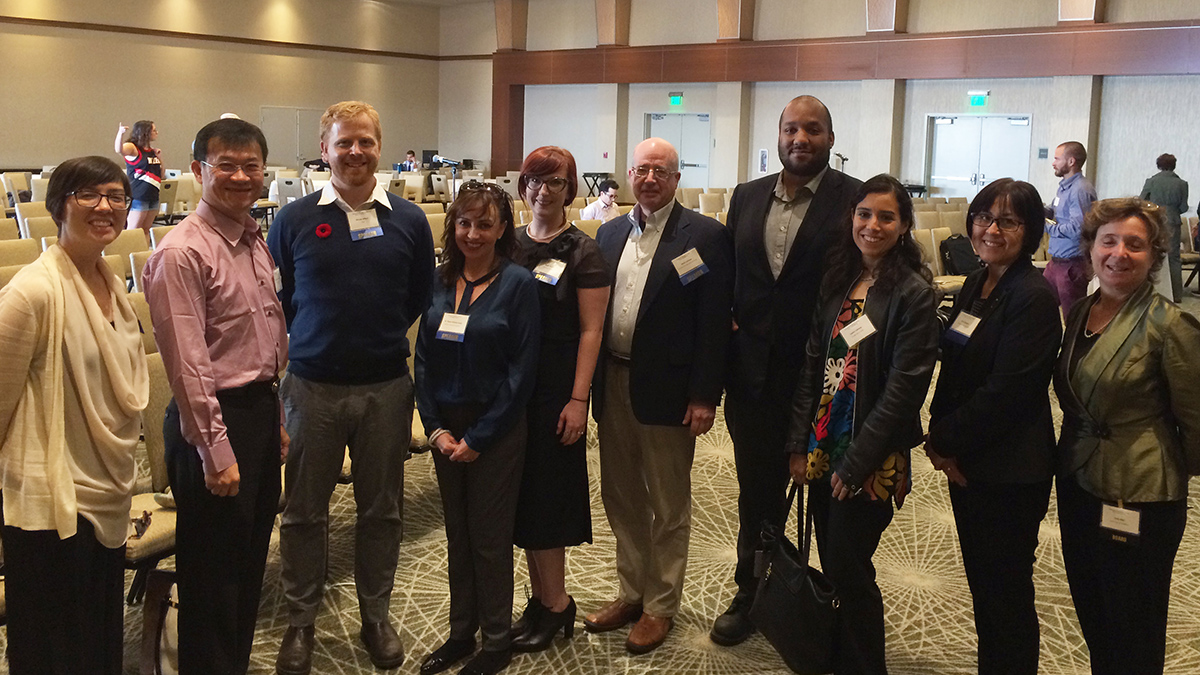Flash TalksNine authors of accepted abstracts were selected to provide 3-minute flash talks introducing meeting attendeees to their research and encourage them to visit their poster. 
From left to right: Karen Rommelfanger (moderator), Kevin Chien-Chang Wu, William Affleck, Karen Herra-Ferrá, Sarah Welch, Denis Larrivee, Timothy E. Brown, Laura Cabrera (presenting for Celizbets Colón-Ortiz), Syd Johnson, and Judy Illes (INS President). Not present: Emily Murphy. Suicide among the Canadian InuitWilliam Affleck, IRCM / McGill University, Canada The suicide rate among the Inuit is 13x the Canadian average. Because of Canadian patient confidentiality practices and a western conception of autonomy, the family is not informed of suicide attempts. The Inuit worldview does not separate the individual from the family and their traditional healing methods include both individual and family. The goal of the research is to understand the Inuit view of autonomy. When neuroethicists become labmatesTimothy E. Brown, University of Washington, USA Brown and Thompson explore the interaction between an electrical engineer and a philosopher—neuroethicist working together on a project involving patient control of DBS. Issues that arose included trust across disciplines and finding measures to gauge the success of the collaboration. Perspectives and terms in the Latin-American and Spanish academic literature regarding neuroenhancementCelizbets Colón-Ortiz & Laura Cabrera, Michigan State University, USA Neuroenhancement is described in many different ways. Compared to the Anglo-Saxon literature, there was a similar level of concern regarding social justice, less emphasis on the nature of the self, and greater discussion of issues of human dignity and spirituality. These differences highlight the importance of a cross-cultural perspective for neuroethics. Integrative neuroscience to define, assess and mitigate recurrent violent behavior (RBV): Technical issues, neuroethico-legal and social concernsKaren Herra-Ferrá, Sociedad Mexicana de Neuroética, Mexico Herra-Ferrá investigated different modalities to serve as psychological classifiers for a DSM definition of RBV. These modalities were then examined through five different neuroethical lenses: technical issues; integrative challenge; neuro-reductionism; societal and/or political influence; and relative imbalance and misalignment of individual, family and public welfare and interests. The Catch-22 of Chronic Traumatic Encephalopathy (CTE)L. Syd M. Johnson, Michigan Technological University, USA Johnson presented three examples of professional athletes (football players and boxers) who exhibited criminally anti-social behaviors during and after their active careers, all of whom died early, all diagnosed with CTE. The earliest stages of CTE may occur even in student athletes, and the disease appears to be progressive even after the athlete’s active career. However, because there is no way to diagnose CTE in a still-living person, a CTE diagnosis cannot serve as a mitigating factor nor to obtain help. In the absence of reason: Ethical reflections on predictive brain implants and self-ownershipDenis Larrivee, Mount St. Mary's University, USA Over 100,000 brain implantable devices have been placed in patients, and the numbers are rapidly growing. Each device’s application is narrowly focused on a single medical condition, but it necessarily impacts autonomy and the integrative unity of the self and so may affect global faculties. In particular, predictive devices, used for Parkinson’s and epilepsy, may reduce self-ownership by preventing assimilation of the reasoned endorsement of values. Ethical considerations on the growing use and addictive properties of Captagon in the Middle EastSarah Welch, George Mason University, USA An illegally-produced, more highly addictive version of the methamphetamine, Captagon, is widely supplied by ISIS to their militants to ensure continued loyalty, and to their suicide-bombers to overcome fear. While enhancing military combatants is not inherently unethical, these uses of Captagon are an example of enhancement gone wrong because of the unethical purposes the drug is used for. Public opinion on the use of neurological evidence in TaiwanKevin Chien-Chang Wu, National Taiwan University, Taiwan Taiwanese courts not yet widely using neuroimaging evidence: only 1% of criminal and 18% of civil competency cases. Public opinion, assessed by 1,036 interviews, was highly against neuroscientific evidence replacing human judgment (>75%). Respondents were more willing to consider mitigating neurological evidence in the case of a brain tumor than in the case of alcohol intoxication, but generally did not place much weight on neuroscientific evidence. – Adrian Byram, University of British Columbia, Canada |
